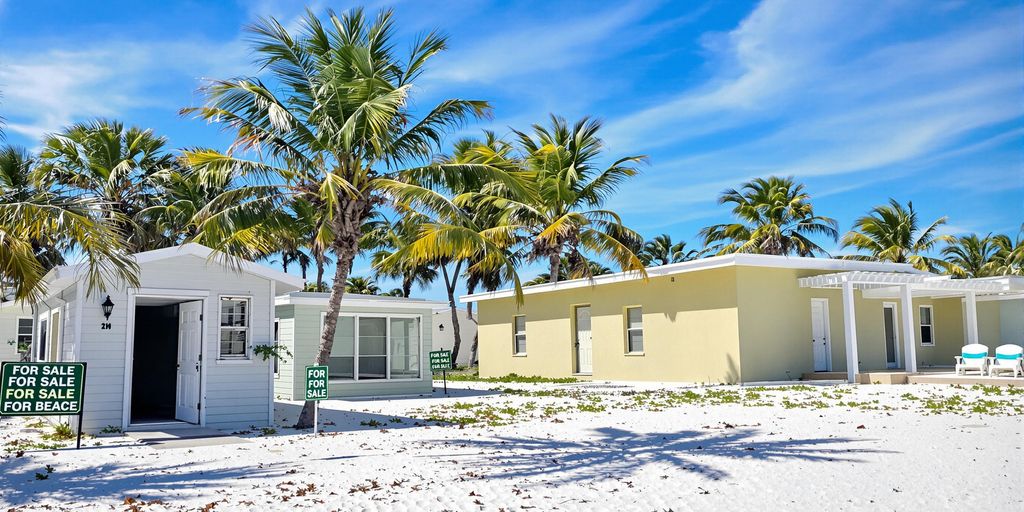Florida’s housing market is undergoing a significant transformation, shifting from a seller’s to a buyer’s market. This change is marked by declining home prices, increased inventory, and longer selling times across many regions. Factors such as high mortgage rates, rising insurance costs, and an influx of new construction are contributing to this market correction.
Florida’s Housing Market Cools Down
The Sunshine State, once a red-hot destination for homebuyers, is now experiencing a notable slowdown. After a pandemic-fueled boom, median home prices are easing, and the supply of available homes is growing. This adjustment is a welcome sign for many prospective buyers who have been priced out of the market.
Key Takeaways
- Price Declines: Median sale prices for single-family homes and condos have decreased year-over-year in many areas, with some markets seeing the largest drops since 2011.
- Increased Inventory: Active listings are up, providing buyers with more choices and reducing the urgency that characterized the previous seller’s market.
- Longer Selling Times: Homes are staying on the market for longer periods, indicating a shift in buyer behavior and reduced competition.
- Affordability Challenges: Despite price drops, high mortgage rates, soaring insurance premiums, and increasing HOA fees continue to impact affordability.
- Condo Market Struggles: The condo market faces additional hurdles due to new reserve requirements and difficulties in securing financing, leading to a significant oversupply in some areas.
Regional Market Snapshot
The market shift is not uniform across Florida, with some regions experiencing more pronounced changes than others.
- Treasure Coast (Martin, St. Lucie, Indian River Counties): Condo and townhouse median sale prices decreased in May compared to April. Inventory levels indicate a strong buyer’s market, with months of supply ranging from 9.6 to 13.3.
- Southwest Florida (Fort Myers): Home prices are down 6.9% year-over-year, and homes are selling after an average of 76 days on the market, compared to 57 days last year.
- Bearish Markets (Orlando, Tampa, Cape Coral, Lakeland, North Port, Deltona): These markets are characterized by an oversupply of listings and significant price declines, with some seeing drops of over 7% year-over-year. Absorption rates are at local lows, and roughly 50% of listings have had price cuts.
- Bullish Markets (Miami, Jacksonville): These two major metropolitan areas are still showing positive signs, indicating continued demand.
Factors Driving the Shift
Several interconnected factors are contributing to Florida’s evolving real estate landscape:
- High Mortgage Rates: Elevated interest rates continue to dampen buyer demand, making homeownership less affordable.
- Rising Insurance Costs: Hurricane-related damages and increased risk assessments have led to skyrocketing home insurance premiums, adding a significant burden to homeowners.
- Increased Supply: A surge in new home construction, particularly during the pandemic boom, has now outpaced demand in many areas.
- Slowing Migration: The rapid influx of new residents seen during the pandemic has slowed, reducing the intense competition for homes.
- Condo Regulations: New statewide regulations following the Champlain Towers South collapse have increased financial requirements for condo associations, impacting sales and increasing fees.
Looking Ahead
While the current market presents challenges for sellers, it offers opportunities for buyers. Experts suggest that the market is undergoing a necessary correction after an unsustainable period of rapid appreciation. The long-term appeal of Florida’s lifestyle is expected to remain, but the immediate future points to a more balanced, and in many areas, a buyer-friendly environment.
Sources
- Condo prices fall in Indian River, St. Lucie and Martin counties, Yahoo News.
- Fla.’s April Housing: Inventory Up, Prices Ease, | Florida Realtors.
- Florida’s Home Price Drops Are a Grim Warning for American Real Estate, Business Insider.
- Most Florida Housing Markets Are in Trouble, Newsweek.
- Southwest Florida real estate shifts to a buyer’s market, WGCU.


